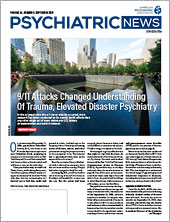For a first-year medical student, attempting to organize a student-run health clinic can be a daunting task. Attempting to create a clinic that offers specialty care for a specific population can be even more difficult. A few years back, however, a pair of enterprising “first years” at the Weill Cornell School of Medicine did both—establishing the first student-run clinic in New York to offer mental health care specifically for the LGBTQ+ community.
Known as the Weill Cornell Medicine Wellness Qlinic, this center offers a range of psychiatric services to all adults who identify as LGBTQ+ free of charge. Since opening its doors in March 2019, the Qlinic has seen dozens of patients and has continued to thrive even during the pandemic.
The Qlinic came into existence following the arrivals of incoming M.D.-Ph.D. students Constance Zhou and Matthew Wickersham to Cornell Medicine in 2017. Zhou and Wickersham are both members of the LGBTQ+ community with a strong interest in improving LGBTQ+ health care, especially mental health care.
Multiple surveys have reported that gay and lesbian individuals are more than twice as likely to be diagnosed with a mental health or substance use problem in their lifetime compared with heterosexual individuals. The risks of mental health problems are even greater among transgender individuals.
Zhou and Wickersham approached Jess Zonana, M.D., an assistant professor of clinical psychiatry at Weill Cornell, with their idea to create a clinic for LGBTQ+ patients. Zonana, who is also chief of adult ambulatory services for NewYork-Presbyterian Hospital’s Payne Whitney Clinic at Weill Cornell, had both the personal interest in LGBTQ+ mental health as well as personal experience organizing a clinic as a medical student (she helped found a student-run primary care clinic while a student at Mount Sinai School of Medicine).
“Creating any free health clinic is a challenge, let alone one that specializes in a specific population,” Zonana said. “But I was so impressed by their vision and energy. I could tell they would have the persistence to make this clinic work.”
Zonana helped the students navigate the various administrative hurdles of setting up a clinic, such as securing a physical space at NewYork-Presbyterian and creating a separate electronic health record system. She also recruited one of her trainees, Jessica Spellun, M.D., who was then a fourth-year psychiatry resident, to bring more residents and clinical fellows into the fold.
Spellun, who is now an assistant professor of psychiatry at Weill Cornell, created an eight-week curriculum on treating patients who identify as LGBTQ+ to train clinic volunteers. The curriculum includes such topics as how to use inclusive language and common health needs of this population.
“There are limited hours of LGBTQ-specific care in psychiatry training, and both patients and doctors have to feel comfortable when having a conversation,” Spellun said. “Establishing this course provided an opportunity to bring in guest lecturers to discuss intersectional issues like LGBTQ and the LatinX community or the role of spirituality in LGBTQ individuals.”
Clinic volunteers are required to complete the eight-week course and participate in a boot camp clinic where they practice working with patients.
The Qlinic, which is open on Wednesdays from 6 p.m. to 9 p.m. by appointment, offers medication management as well as individual psychotherapy provided by trained therapists and group therapy led by the students. Patients are also educated about navigating the mental health system and other options for treatment, Zhou said.
Zonana said the group sessions—which employ principles of dialectical behavioral therapy to teach participants important coping skills—have been especially well-received by both staff and patients. “The sessions [also] give students a primary role in interacting with and treating the patients,” she said.
Though the Qlinic is available to all adults 18 and over, most of the patients who have used the services so far have been young adults, which could be attributed to multiple factors, Spellun explained. The Qlinic has used social media as a primary means of advertising its presence, and younger individuals might feel more comfortable interacting with providers of their age, she said.
“I can also envision that many young LGBTQ adults may not be comfortable using their parents’ insurance since they may not have disclosed their identity,” said Spellun, who serves as the mental health director for the Qlinic. “Our free clinic offers a valuable, safe space.”
Zhou noted that the influx was slow at first. “We had one patient in our first month, and then three in the next month. I think whenever you have something completely new there will be some skepticism.”
Over time, though, more and more people found their way to the Qlinic and it became a local success story. “In fact, we had just assembled a newsletter celebrating our one-year anniversary [when COVID-19 hit],” Zhou told Psychiatric News.
As with other health centers, the Qlinic managed to quickly adapt to a remote environment and continued to provide weekly virtual care on Wednesday evenings. “There were even a few unexpected upsides,” Zonana noted. “Many more students could get involved as they had been pulled off non-essential medical rotations. Also, patients who lived in the outer boroughs liked the easier access and not having to travel back home late at night.”
Though New York City is in the process of opening back up, Zonana told Psychiatric News that the Qlinic will remain virtual for the near future. As they plan ahead, they are looking at striking a balance between the increased accessibility of telemedicine versus the social benefits of face-to-face interactions.
“The ability of senior-level physicians to volunteer will always limit how much the clinic can do, but we do want to expand in some capacity,” Spellun said. For instance, she hopes to enlist the help of social workers and case managers to work with patients dealing with complex issues, such as helping a transgender individual navigate the transitioning process.
“I am proud of all we have done,” Spellun continued. “We are providing mental health care to a vulnerable cohort that may otherwise lack access while helping future physicians feel competent and confident when treating LGBTQ patients.”
“I think of my work at the Qlinic as a part-time job on top of my studies,” said Zhou, who is currently in the Ph.D. portion of their program. “It is exhausting sometimes but when I’m at home at the end of a long day and think about the people this clinic has helped, it has all been worth it.” ■
More information on Cornell’s Wellness Qlinic is posted
here.

